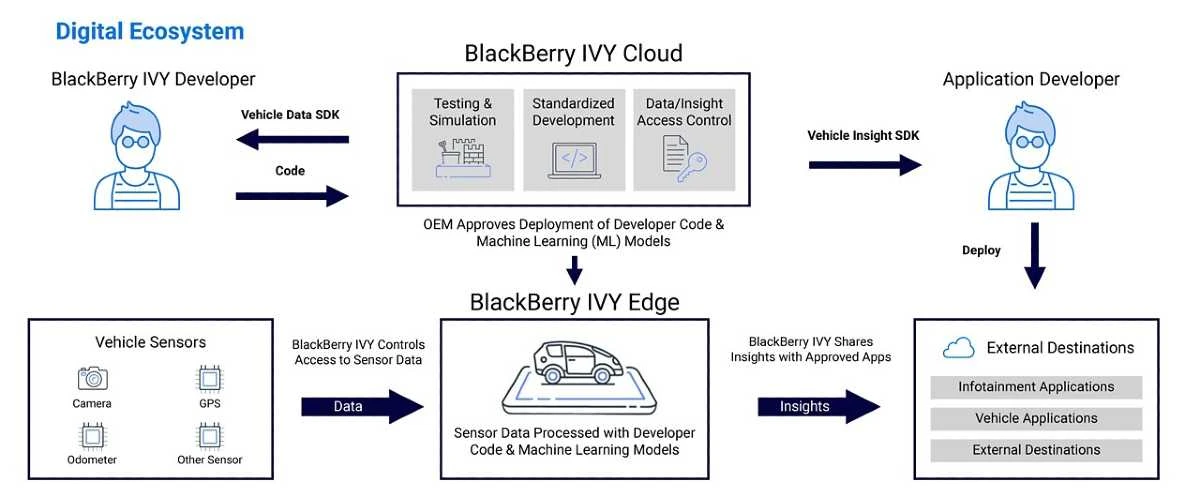BlackBerry and Ridecell are teaming up to bring a next generation fleet operations and ADAS data platform to automotive OEMs via the BlackBerry IVY intelligent vehicle data platform.
The integrated solution would enable OEMs to provide fleet operators with the tools they need to turn fleet management insights into automated actions that include responding to maintenance and diagnostics alerts, automating vehicle access control, and vehicle disablement if stolen, along with generating crash analytics reports to satisfy government regulations.
Ridecell’s Fleet IoT Automation Platform is the leading platform powering digital transformation and automation for fleet-driven businesses. With BlackBerry IVY, OEMs would be able to easily deploy Ridecell solutions directly to the vehicle in real-time to unlock new revenue streams and save on data connectivity.
BlackBerry IVY enables automakers to unlock rich insights from vehicle data without significant connectivity or cloud storage costs through a scalable, cost-effective, car-to-cloud platform that provides developers with a consistent and secure way to analyse sensor data.
“BlackBerry IVY’s intelligent vehicle data platform transforms the vehicle experience for OEMs, business fleet operators, and solution providers like Ridecell,” said Shiva Kumar, CFO of Ridecell.
“Ridecell is rooted in automotive mobility, so a collaboration with BlackBerry IVY to explore what our two companies can do together is natural for us. Bringing our fleet IoT automation solutions to a platform that runs on all vehicles opens up automated solutions to any fleet.
With Ridecell and BlackBerry IVY, OEMs could one day be empowered to customize their vehicle experiences and embrace new revenue opportunities.”
The collaboration also covers Ridecell’s AI-powered NEMO Data Platform integration with BlackBerry IVY. NEMO analyzes data from vehicle sensors and driving history to understand critical events, including accidents. OEMs can also take advantage of NEMO to advance their assisted driving systems to improve safety as well as comply with the recent National Highway Traffic Safety Administration (NHTSA) ruling on crash analytics, as the platform automatically generates accident reports in minutes.
With BlackBerry IVY, NEMO could use in-vehicle computing to derive real-time AI insights and to filter for scenarios of interest, saving on connectivity and cloud costs for the OEMs.
“With a shift to shared mobility and an industry-wide capacity crunch that shows no signs of easing up anytime soon, the need for fleet operators and OEMs to holistically manage the overall health of their vehicles throughout their full lifecycle is absolutely critical,” said Peter Virk, Vice President of IVY Product and Ecosystem, BlackBerry.
“With Ridecell, we will offer customers an intuitive platform to turn insights into action across their entire fleet. Customers will immediately see efficiencies that can be achieved when fleet managers and OEMs have unparalleled visibility into their vehicle assets and the capability to automate actions based on BlackBerry-IVY led fleet insights.”

BlackBerry IVY
Announced in December 2020 as part of a multi-year, global agreement with Amazon Web Services (AWS), BlackBerry IVY is a scalable, cloud-connected software platform that will allow automakers to provide a consistent and secure way to read vehicle sensor data, normalize it, and create actionable insights from that data both locally in the vehicle and in the cloud. Automakers can use this information to create responsive in-vehicle services that enhance driver and passenger experiences.
BlackBerry IVY addresses a critical data access, collection, and management problem in the automotive industry. Modern cars and trucks are built with thousands of parts from many different suppliers, with each vehicle model comprising a unique set of proprietary hardware and software components.
These components, which include an increasing variety of vehicle sensors, produce data in unique and specialized formats. The highly specific skills required to interact with this data, as well as the challenges of accessing it from within contained vehicle subsystems, limit developers’ abilities to innovate quickly and bring new solutions to market.
BlackBerry IVY will solve for these challenges by applying machine learning to that data to generate predictive insights and inferences, making it possible for automakers to offer in-vehicle experiences that are highly personalized and able to take action based on those insights.
BlackBerry IVY will support multiple vehicle operating systems and multi-cloud deployments in order to ensure compatibility across vehicle models and brands. It will build upon BlackBerry QNX’s capabilities for surfacing and normalizing data from automobiles and AWS’s broad portfolio of services, including capabilities for IoT and machine learning.
BlackBerry IVY will run inside a vehicle’s embedded systems, but will be managed and configured remotely from the cloud. As a result, automakers will gain greater visibility into vehicle data, control over who can access it, and edge computing capabilities to optimize how quickly and efficiently the data is processed.
With BlackBerry IVY’s integrated capabilities, automakers will be able to deliver new features, functionality, and performance to customers over the lifetime of their cloud-connected vehicles, as well as unlock new revenue streams and business models built on vehicle data.



